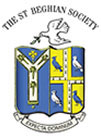|
 |
The Old St Beghian | |
| July 2025 | |||
Mark Davies (G 55-59) writes about George:
“I was saddened to hear from his brother Dimitri that my great friend George Sklavounos had recently passed away. We were exact contemporaries at St Bees, entering Grindal in 1955, and though we spent our lives at opposite ends of the globe we managed to stay intermittently in touch. We were not the only overseas students, even in those days, but we formed a special bond through our Greek connection, he as a native speaker, I after five years in Greek primary schools. Also, we faced the rigours of English public school life from a similar perspective, inadequately prepared as sportsmen, a little insubordinate and with a knack of getting into trouble. Later we would recall our various escapades with tears of laughter. As general fags George and I were frequently responsible for the prefects’ tea, and on one occasion, when three of them were playing in a 1st XV away match against Egremont, I remember we cycled back to prepare it but got hopelessly lost in the mist and rain. By the time we got in it was too late to prime the coke furnace in the basement for anything better than smoked toast, and we paid for our sins with a stiff ‘Sea Mills’. Then on a 3Q day and strictly against regulations, we cycled to my grandmother’s in Bowness, but after a heavy lunch and despite George’s ultra-light-weight bike, we didn’t make it back before the supper curfew. Crossexamined by the housemaster, Sam Parkinson, we lied through our teeth, only to discover that our secret destination had been leaked. Justice was swiftly served the next morning with six of the best. George’s nickname, Sklashitproof, was in fact complimentary (compared to say Bog, Pasha, Marlon, Jelly-legs and Lead-head), referring to his imperturbability in hazing sessions, and attested to his inherent strength of character. He also had a great sense of humour, and he and his pal John Anderson would have us all in stitches with imitations of the Goon Show. Both of them were passionately interested in short wave radio, one of the many extracurricular activities the school provided for us, and I also remember them in hot water over an alcoholic ginger beer bottling operation which took over their Quonset hut study.
George left St Bees a year before me when his father, a marine engineer, moved the family from Barrow to Acton, and when I visited them there, George had shed his blazer and saxe blue stockings for a dark tailored suit and had morphed into a sophisticated man about town. I remember a whirlwind tour of the West End with him and his older cousin, a merchant sea captain, and gaining a glimpse of the Greek shipping world in the father’s busy office. Cars were more of an adventure in those days and George had sanded down an old Rolls Royce, which sat sedately rusting in their front garden; my grandmother had to hang up her washing round my brother Nigel’s even larger Lanchester; and Grindal mates Chris Ward, Stuart Lyon and I drove to Greece in a 1946 Vauxhall. The ladies undoubtedly found George a charmer - not just handsome but beautiful, as my girlfriend at the time told me disconcertingly when he came up to Oxford for the day. Yet his English marriages did not work out and when we next met, he had moved to Athens, married a beautiful Greek girl (exemplifying the triumph of hope over experience, as Dr Johnson defined remarriage) and was running a highly successful shipping and agricultural products business. He summed up his thoughts on bicultural marriage to me with an untranslatable Greek proverb: the drift being ‘better the devil you know’. He was immensely proud of his daughter and accompanied her on her European dressage circuit. Recently their Ekali home was threatened by fire, their SUV spontaneously combusting, and they had to consider moving, but George faced these issues and his declining health with cheerful stoicism.Shortly before retirement, George arranged a reunion of a few Grindal contemporaries in the village, including John Anderson, Gordon Cartmell, Ian Mathieson, Chris Ward and me, but then amusingly, he failed to turn up from Athens himself. I’m not sure that he felt his school days were the happiest days of his life, but he would perhaps have agreed with Gordon’s verdict that the Spartan conditions, hierarchic structure and strict discipline of the postwar St Bees we knew probably didn’t do us any harm. A contemporary on another house told me recently that what he especially appreciated about St Bees was the freedom — the 3Q days. I admired George’s positive outlook, generosity and wry humour and remember him fondly. I would like to extend sincere condolences to his wife Niki and daughter Kelly, his daughters from his first marriage Katherine, Charlotte and Eugenie, and to his siblings Polytimi and Dimitri.”
Home
The St Beghian Society
St Bees School,
St Bees, Cumbria, CA27 0DS.
Tel: (01946) 828093 Email: osb@stbeesschool.co.uk
Web: www.st-beghian-society.co.uk
![]()